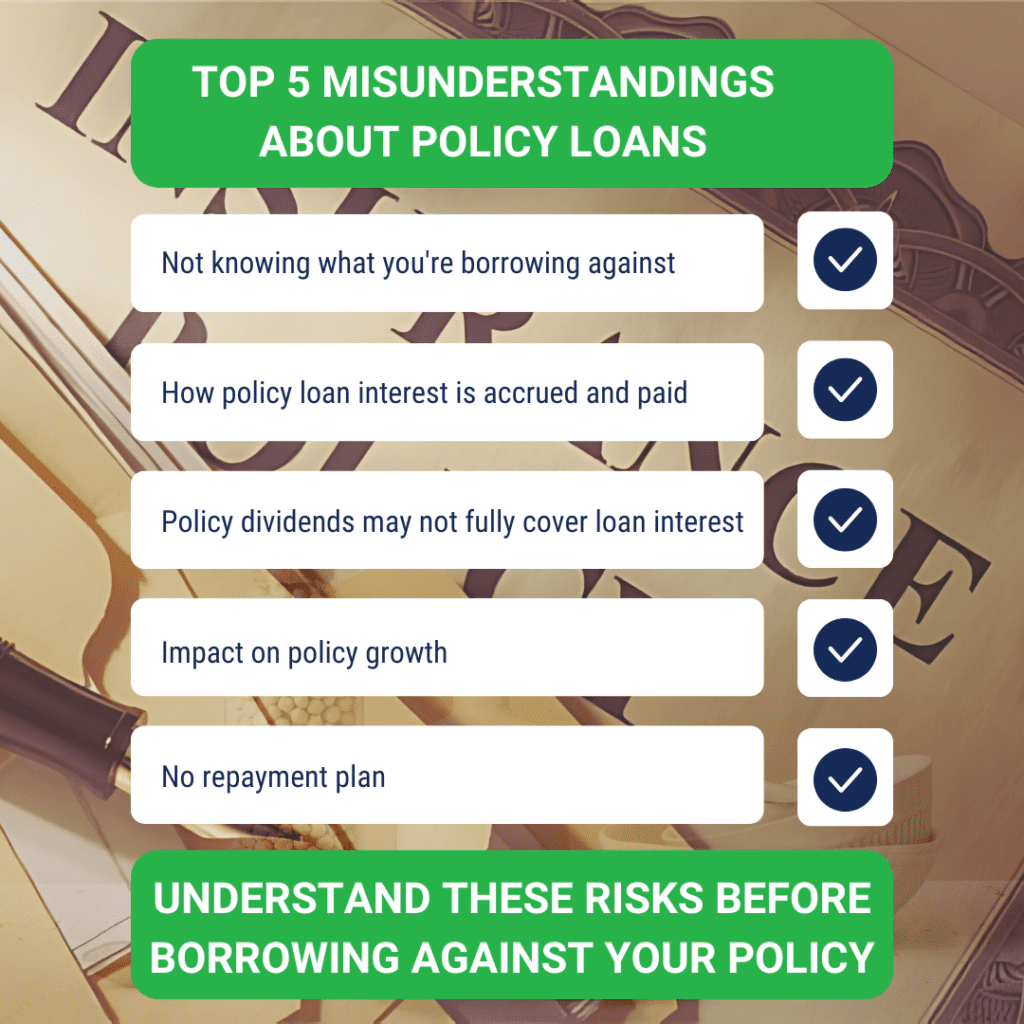702-660-7000
702-660-7000

Advocating the ability to leverage your life insurance policy for needed cash flow or investment capital has become a common approach for the life insurance industry to promote and sell higher premium life insurance products. Whether those products be some form of universal life or high cash value whole life, the novelty that you can still earn an internal rate of return on the premiums you’ve paid while leveraging the cash value growth in your life insurance policy, has obviously proven intriguing as sales have risen for these products. Yet, it is also evident that the risks involved when leveraging life insurance cash values have not been fully clarified or understood, as many policy owners have suffered unneeded financial loss due to exercising their option to borrow against their policy cash values. (See the Five Dangers Associated with Using Cash Value Life Insurance and The Sordid Tale of Two Sisters: How Indexed Universal Life and Participating Whole Life Differ Significantly.)

That being said, there remains much misinformation out there, which can lead to even further confusion about the risks involved when taking a policy loan against the cash value of your life insurance. Some of these risks include:
These are merely a few of the common misunderstandings surrounding policy loans and each of these common misunderstandings can impact your policy’s performance, its payout and its tax-ability, depending on what type of cash value life insurance you own and how much premium you have or haven’t paid, or even how long you have had a policy loan out against your policy. Hence, it behooves you to become familiar with and to know exactly how these misunderstandings could create some inadvertent costs for you down the road. And you should do this prior to taking your first policy loan, or perhaps even before deciding on which type of insurance to purchase.
In a Bankrate.com write-up on life insurance policy loans, they actually publish some misinformation that ironically, you’d think they would know better than to circulate. Here is what that Bankrate.com report states about policy loan interest, don’t “trust that the dividends from your variable universal life insurance (VUL) policy will automatically cover it.”[i] The problem with this statement from Bankrate.com is, VUL insurance doesn’t pay dividends. (Which, by the way, neither does, “term life, index universal life or traditional universal life.”)[ii] And so, while Bankrate.com sets out to educate its readers about a valid concern, policy loan interest, it actually muddies waters that are already cloudy, instead of clearing them, concerning dividends.
So, here’s the straight scoop:
When you leverage your life insurance policy, you are borrowing money from the insurance company. You are not borrowing the cash value that has built up in your policy.
Think of it as taking a home equity line of credit (HELOC) on your home. The bank doesn’t give you back money you have paid on your home to use. They simply lend you money that they have available to lend that depositors have entrusted them to manage for them. When you make payments on that HELOC, you make interest and principle payments to the bank. Those payments may or may not restore your line of credit depending, on how the HELOC was set up. But with a life insurance policy loan your LOC is restored as you pay the principle of your policy loan back, while the interest you pay on your policy loan goes to the insurance company.
With a cash value policy loan, as is the case with most HELOCs, you are required at least to pay the interest. If you don’t pay this interest out of pocket, then the policy’s accrued cash values will be used to pay this interest. If the accrued cash values are not sufficient to pay this required interest payment then the policy will collapse and you will owe taxes on any interest paid from accrued cash values that is over and beyond what you have paid in premiums on that policy. This accrued cash value growth is tax deferred as long as the policy is in force but when it is surrendered, lapses or collapses from lack of funding or accrued interest owed, then you could face some inadvertent tax liabilities if you don’t understand this information.
Here you must stop and realize that the cash value in a whole life policy is distinctly different from accumulated cash value in traditional universal life, variable universal life and index universal life (in the past known as equity indexed universal life.) In all universal life products, the accumulated cash value is a combination of extra money that you have paid into the policy as premiums plus the earned interest or return on investment that the participating portion of your accumulated cash value has earned. With whole life insurance, and particularly participating whole life insurance, the cash value represents the total value of the paid-up insurance that you own. The amount of paid-up insurance that is owned in a participating whole life policy will determine how the insurance company portions out the dividend it earns each year with each policy owner.
Knowing this will help you decide which policy is best suited to borrow from. In universal products when you borrow against your policy, the insurance company (insurer) will move the total amount of your loan out of the investment portion of your accumulated cash value and hold it as collateral in a guaranteed fixed interest account.
“We don’t want to expose that collateral to market downturn that could result in negative equity in that policy.”[iii]
When the insurer moves this money, they will charge you the difference between what the fixed account is earning and what the invested account was earning. They do this by adding this difference onto your policy loan interest. If that interest is not paid out of pocket by the owner of the policy then it is added to the loan balance annually.
“What people don’t understand is that this interest has to be paid. You’re going to pay it out of your pocket or you’re going to borrow it from your policy.”[iv]
With a participating whole life insurance policy, the collateral for your policy loan is your paid-up-insurance. Now reflecting back on the HELOC example previously mentioned, when you take a HELOC out against your home, the bank doesn’t keep you from using or living in your home. The same is true with a policy loan leveraged against a participating whole life policy. You still benefit from owning that paid up insurance even though it is being held as collateral. So, because you still own that paid up insurance (you are only using it as collateral) you will still get the benefits that is provides. And one of those benefits is the dividends the insurance company will share with you annually based upon how much paid up insurance you own in your policy.
Of course, at the time you die, if the policy loan is still outstanding, the death benefit will pay off any outstanding policy loan, and what is remaining will be paid to your beneficiaries. This again, can be likened to a HELOC. If you sell your home while you have a HELOC outstanding, the bank will take the proceeds of that sale and pay off your HELOC. All the money remaining after your HELOC has been paid in full, and any other mortgage or lien is satisfied, will go to you, because it was your house that you sold. This outlines the big difference between borrowing from universal life insurance policies and borrowing from participating whole life policies.
Comprehending the differences between universal and whole life insurance can keep you from inadvertently experiencing huge tax liabilities, extra interest charges and surprising lapses of your life insurance coverage. Knowing how your life insurance policy works is important even if your life insurance agent may not have explained exactly how all the parts of your life insurance policy functions at the time you purchased it. In order to better understand and avoid costly results down the road, it behooves you to have your life insurance policy reviewed at least once a year by someone who can help you understand exactly how it all works.
Many life insurance agents don’t offer this service, or if they do, they charge you a fee. Here is where we can be of service to you. Contact our office at 702-660-700 to receive help with a policy review. Of course, we offer this valuable service to anybody who owns or who is thinking about purchasing a life insurance policy, because we hope to earn your respect, trust and business. But there are no strings attached to our offer. All we ask is that you give us the opportunity to assist you in finding out if your policy, or the policy you are thinking about purchasing, can work in your best interest both now and in the future because you should find out sooner, rather than later, how you can best manage your money.
 Tomas P. McFie DC PhD
Tomas P. McFie DC PhD
Tom McFie is the founder of McFie Insurance and co-host of the WealthTalks podcast which helps people keep more of the money they make, so they can have financial peace of mind. He has reviewed 1000s of whole life insurance policies and has practiced the Infinite Banking Concept for nearly 20 years, making him one of the foremost experts on achieving financial peace of mind. His latest book, A Biblical Guide to Personal Finance, can be purchased here.
[i] http://www.bankrate.com/finance/insurance/are-life-insurance-loans-a-bad-idea-1.aspx
[ii] https://www.google.com/search?q=do+variable+life+insurance+policies+pay+dividends&oq=do+variable+life+insurance+policies+pay+dividends&aqs=chrome..69i57.14679j0j7&sourceid=chrome&ie=UTF-8
[iii] Byn Mawr, The American College of Financial Services, Pennsylvania.
[iv] Ibid